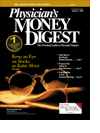Close-Up: Tax Code
n.
Tax Code: Also called the pay-as-you-earn code, it is used to designate the tax type, rate, and calculationmethod that will be applied to a transaction, such as the tax to be deducted from a paycheck.
Money
The word from the Bush administration is thatthe president is desirous of drastically overhaulingthe tax code. His goals are to maketax laws simpler, reward saving and investing,and have the changes be revenue-neutral (ie, thesame amount of money would flow into governmentcash registers). The tax code as it stands today runsthousands of pages and forces Americans to spend acombined 6 billion hours filling out paperwork eachyear, according to an article in . As such, thoseproposed changes should be met with fanfare.
However, no one is dancing in the streets just yet.That's because President Bush also wants to repealthe estate tax and make the tax cuts of 2001 and 2003permanent. Considering that the proposed changeswould be revenue-neutral and the nation is alreadyfacing a $400-billion budget deficit, it's a good betthat many taxpayers will shoulder a greater burden.The form the revamped tax code will end up takingis anybody's guess.
Flat Tax Revisited
The administration has hinted that it is unlikely toreplace the existing tax code with a flat income taxrate, though that would be the simplest of all reforms.According to the article, under a flat tax system,everyone's income would be taxed at the identicalrate, such as 20%. There would be no deductions. It'snot exactly a new idea, but it does come with itsshare of problems.
For starters, if President Bush keeps his word notto eliminate mortgage interest and charitable deductions,there can be no true flat tax. More importantly,the tax rate would probably be somewherebetween today's highest and lowest rates. That meansthe wealthy would receive a major tax break whilelower-income earners would take a huge tax hit.
Sales Tax Solution
There is some Congressional support for a salestax resolution, which would tax consumption ratherthan income. According to the article, this could takethe form of a value-added tax, where "goods aremarked up at each level of production."Or it couldtake the form of a national sales tax, similar to thebill being sponsored by Congressman John Linder,which proposes a 23% tax rate on the purchase of allgoods and services.
While a sales tax proposal provides an incentive tosave since you're only taxed on what you spend, thereare some drawbacks. As the article points out, groceriesare currently exempt from state sales taxes. Ifthat continued, the rate for a national sales tax wouldhave to be higher than 23% to offset the difference. Inaddition, the Linder bill includes a rebate formula forlower-income Americans that, in effect, could make thenew system as complex as the current one.
Stealth Tax Favored
Money
Stealth consumption tax is the one that magazine calls "the odds-on favorite for passage."Think of it as a recipe for trying to improve on yesterday'smeatloaf, without throwing away whatyou've already cooked.
As the article explains, this format would take thecurrent tax code, factor in tax breaks for investmentsand savings, add new tax-free savings vehicles, simplifysome rules, and mix them all together.
Why is it considered the frontrunner? By excludingmore savings from taxation, it provides additionalincentives to save. But perhaps more importantly,it won't require a nasty political showdownthe way a major overhaul such as a true flat taxwould.
Still Alive for 2005
Money
For now, the tax code remains unchanged. Thatmeans there is still a nice laundry list of items thatcan be deducted for 2005. According to magazine,they include the following:
• A maximum of $14,000 can be contributed to a401(k) or similar retirement account. If you're age 50or older, the catchup amount is increased to $4000.
• If you donate a used vehicle to a charity, youcan deduct the amount the charity netted for thesale of the vehicle.
• For at least 1 more year, you can choosebetween deducting either your state sales tax oryour state income tax on your federal return. If youlive in states like Florida and Texas where there is noincome tax, this can be a big deduction.
• Is your spouse a teacher? If so, they can stilldeduct $250 for the purchase of classroom supplies.
• The basic standard deduction for a married coupleis expected to increase by $300, to a total of $10,000.
• Your IRA contribution limit climbs to $4000 in2005, but the catchup contribution amount remainsunchanged at $500.
Pop Quiz
1) The national budget deficit currently stands at
- $100 billion
- $200 billion
- $300 billion
- $400 billion
2) The scenario where everyone's income would betaxed at the identical rate is called
- Flat tax
- Sales tax
- Stealth consumption tax
- None of the above
3) Which scenario would tax consumption ratherthan income?
- Flat tax
- Sales tax
- Stealth consumption tax
- None of the above
4) For individuals under age 50, the maximum 401(k)contribution for 2005 is
- $12,000
- $13,000
- $14,000
- $16,000
5) The standard deduction amount for a married couplein 2005 is
- $10,000
- $12,000
- $15,000
- $18,000
Answers: 1) d; 2) a; 3) b; 4) c; 5) a.
